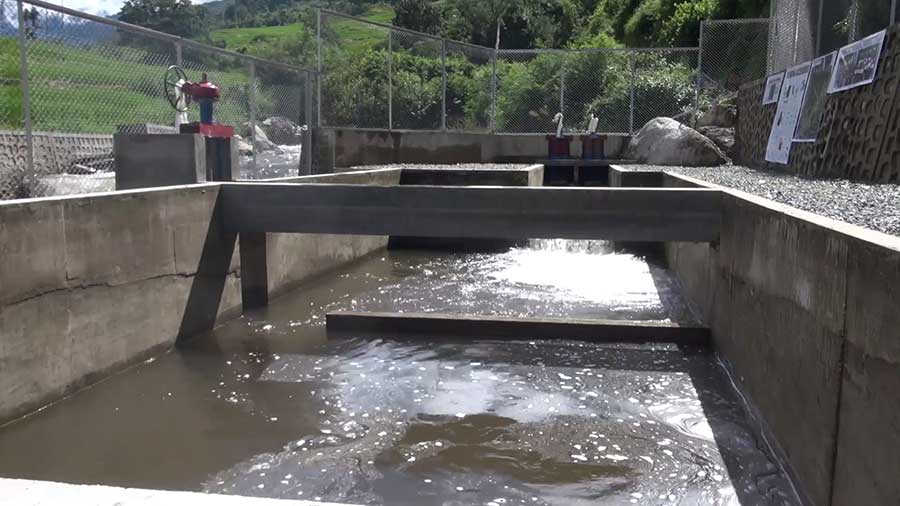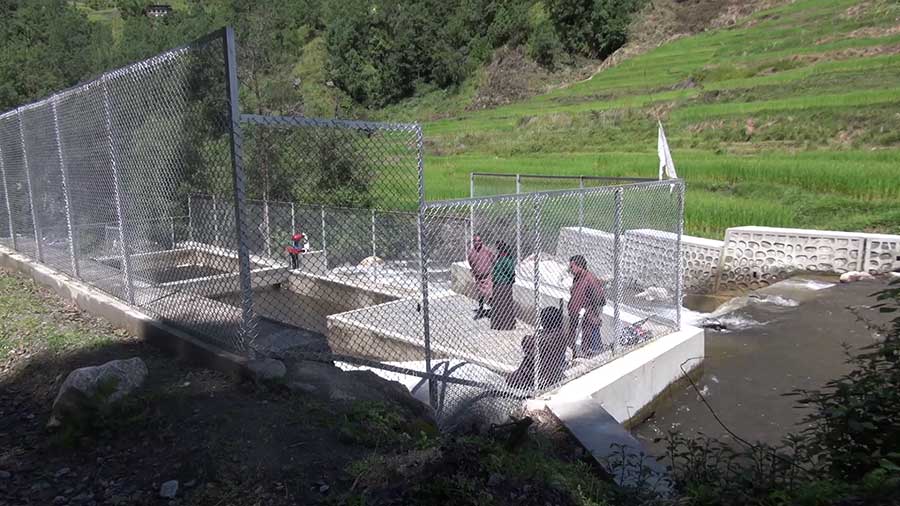
Bhutan is known for its rich water resources, but oftentimes farmers are forced to leave their fields fallow because of unreliable irrigation water supply. Open irrigation water canals are vulnerable to climate-related crises like landslides. The mountainous landscape of the country makes the matter worse. To address this, the United Nations Development Programme in the country is helping the government build climate-resilient irrigation water systems. This time it is in Punakha.
 The newly constructed irrigation water supply system was inaugurated on Thursday. The concrete intake water tank in Shengana will cover 12 villages in Shenga-Bjimi, Dzomi and Lingmukha Gewogs. It is expected to provide a steady supply of water to farming communities. Unlike in the past, the water will be supplied through pipes.
The newly constructed irrigation water supply system was inaugurated on Thursday. The concrete intake water tank in Shengana will cover 12 villages in Shenga-Bjimi, Dzomi and Lingmukha Gewogs. It is expected to provide a steady supply of water to farming communities. Unlike in the past, the water will be supplied through pipes.
“Open channel has been replaced with the HDP pipe system. Whatever amount of the water at the source will be able to deliver at the user end, this is because there is no seepage along the alignment. So, in that sense even if there is a landslide, there is no blockage of the waterway. This is the change in the design of the irrigation system,” said Sherub Gyeltshen, the Project Manager from the GNHC.
The irrigation water supply is constructed based on the Climate-resilient system scheme with a permanent and concrete intake water tank at the source and supplying through pipes, unlike the earlier open-channel supply system.
“Unfortunately, in many countries, we have not taken care of the water resources that mother earth gave to us. So, we are losing our food system, food production, food security and nutrition. And this is something that we are trying to address including here in Bhutan,” said Kanni Wignaraja, the UN Assistant Secretary-General and UNDP Regional Director for Asia and Pacific.
The Project Manager also says that there will be no effect on the supply even if the water volume decreases at the source during winter. The water will be stored in the intake chamber at the source and will be supplied continuously.
 The project has already benefited the farmers. Some say they used the irrigation water from the newly constructed source and did their paddy cultivation works in time.
The project has already benefited the farmers. Some say they used the irrigation water from the newly constructed source and did their paddy cultivation works in time.
“We never used to get enough water in the past. By the time the water reaches our end, it becomes small due to the seepage along the channel. But now after constructing a water tank at the source and supplying through pipes by the project, we are receiving abundant water without any problem,” said Sangay Wangdi, a farmer in Dzomi Gewog.
“The irrigation water supplied in water pipes till halfway of our village is benefiting us a lot. We can also do our paddy cultivation works on time. Likewise, we expect the same supply even in winter,” added Sangay Rinchen, from Lingmukha Gewog.
“We could not cultivate anything in the winter last year due to water shortage. We could do only the paddy cultivation works this time. Now I am looking forward to cultivating wheat and mustard plants this winter. I think such a reliable water supply will help in achieving the self-sufficiency goal,” said Namgay Thinley, from Dzomi Gewog.
Although the project is 13.5 kilometres from the source, the waterpipes covered only four kilometres from the source. Some farmers are requesting the whole stretch pipe coverage until Gumkarmo village in Lingmukha.
However, the project manager assured that the vulnerable stretch to seepage and landslides is already covered by the pipe. He said the Dzongkhag and gewog can continue with the remaining stretch in the next five-year-plan.
 The irrigation water supply will be operated by the community water user group hereafter.
The irrigation water supply will be operated by the community water user group hereafter.
The project worth more than Nu 30.7 M was funded by the Green Climate Fund. The Green Climate Fund was instituted to support the efforts of developing countries in responding to the challenge of climate change. It helps vulnerable societies adapt to the unavoidable impacts of climate change.
There are 36 such projects in the country in the five-year project plans from 2020 to 2025. Ten projects are already completed.
Changa Dorji, Punakha
Edited by Sonam







